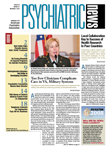Medicaid beneficiaries with chronic psychiatric disorders may lose their access to rehabilitative services under a proposed rule from the Centers for Medicare and Medicaid Services (CMS).
The proposed rule is part of revisions to regulations governing Medicaid rehabilitative services, proposed in August, that CMS says will strengthen beneficiary protections through “person-centered” written rehabilitation plans and maintenance of case records. The changes also are expected to have considerable cost savings for Medicaid, estimated by CMS officials to be about $180 million in the first year and $2.2 billion over the next four years.
The tightening of rehabilitative language was meant to keep non-Medicaid programs, such as local jails, from using Medicaid funds to provide benefits to people in programs “with a focus other than that of Medicaid,” according to CMS.
“These facilities are under the domain of the juvenile justice or youth systems in the state, rather than Medicaid, and there is no assurance that the claimed services reflect an independent evaluation of individual rehabilitative needs,” according to a CMS statement on the need for the rules changes. “This proposed [rule] is designed to clarify the broad general language of the current regulation to ensure that rehabilitative services are provided in a coordinated manner that is in the best interest of the individuals, are limited to rehabilitative purposes, and are furnished by qualified providers.”
The proposed changes also would limit Medicaid reimbursement to those whose rehabilitation care is designed to return them to a higher level of functioning, as opposed to trying to improve the functioning of those who have always been impaired.
APA and other advocates maintain, however, that those changes would cut off some beneficiaries with chronic psychiatric disorders from receiving rehabilitative services through Medicaid.
In comments submitted to the agency in response to the proposal, APA urged CMS to broaden rehabilitative services language to include rehabilitative services for beneficiaries who do not have a previous higher level of function and for those who need the services just to maintain their current level of functioning.
“This concept is essential to a broad spectrum of beneficiaries who should receive Medicaid rehabilitative services, especially those with chronic psychiatric disorders,” said APA Medical Director James H. Scully Jr., M.D., in an October 12 letter to CMS. “It is not always clear in advance who may experience functional improvement through access to these services.”
“Those with chronic, serious psychiatric disorders may experience benefits from rehabilitative treatments that are improvements other than restoration of pre-existing functional levels,” Scully stated.
APA and other mental health groups, including the U.S. Psychiatric Rehabilitation Association (USPRA), did commend CMS for some of the proposed changes such as the requirement that those who provide rehabilitation services develop rehabilitation plans and “recovery-oriented goals” for each beneficiary.
“The creation of a rehabilitation plan is good practice and is necessary for shared decision making and accountability,” said Marcie Granahan, CEO of USPRA, in a letter to CMS.
The most effective approach for beneficiaries with serious, chronic psychiatric disorders is acute treatment along with ongoing rehabilitative services, Scully noted.
Another change sought by APA is clarification of language in the proposed rules that critics interpret as a categorical exclusion of Medicaid payment for “personal care services, transportation, [and] vocational and prevocational services.” Scully suggested that such an interpretation should not be accepted by CMS, since it would be inconsistent with CMS's stated intent to allow Medicaid coverage for at least some such services related to rehabilitation.
The CMS rules also need language to require that physicians perform the mandatory “comprehensive assessment” of beneficiaries proposed by the rules, said Scully, with psychiatrists performing the psychiatric assessments, “especially where physical comorbidities are at issue.”
“The better the assessment, the more well targeted the rehabilitation plan can be for maximum outcomes,” Scully wrote.
The proposed rule was open to public comments until mid-October. There is no timetable for CMS to issue final regulations.
The proposed changes can be accessed at<www.gpoaccess.gov/fr/index.html> by selecting volume 72, pages 45201-45213. ▪
